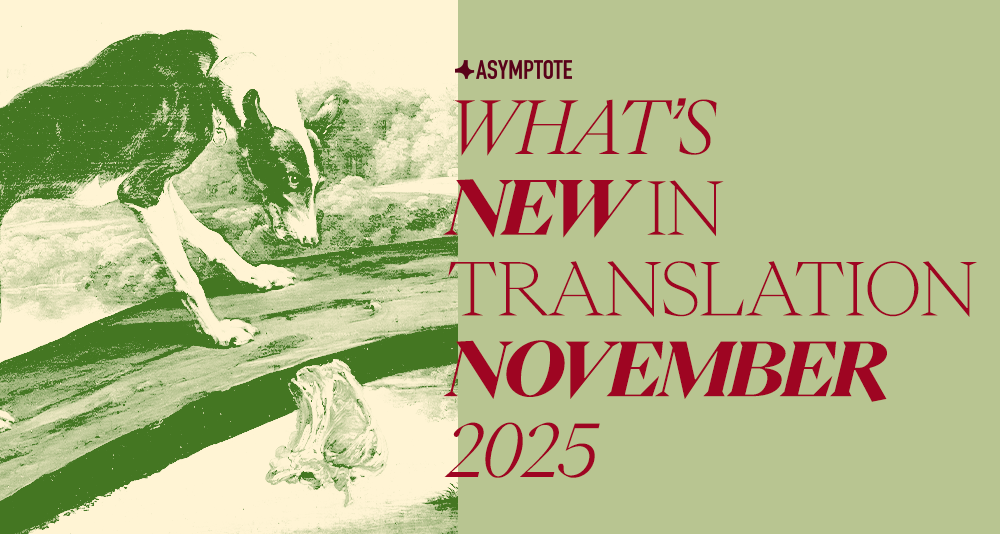This month, we’re bringing reviews of eleven different titles from eleven different regions, from a trilingual text of experimental fiction that veers between Vietnamese and English, a visceral and psychically frenetic portrait of a marriage gone wrong, a rich collection from a master Iranian poet that gestures towards his remarkable life, and the latest metafiction from a Spanish literary giant.

Dog Star by Nabarun Bhattacharya, translated from the Bengali by Subha Prasad Sanyal, Seagull Books, 2025
Review by Jason Gordy Walker
Something’s rotten in the city of Kolkata. A corrupt managerial class—within which mad scientists and war-mongers play a major role—has conspired with local authorities to capture, confine, and starve as many canines as possible. While the city’s “dead serf-servants and healthful, cellphone-carrying ever-connected mummies and balloons” stagger through their dystopia, the dogs have disappeared from the urban bustle, and no one cares. Animal rights groups have been eliminated, and in the way of Nazi death camps, the system targets even newborn pups. What’s a dog to do in these last dog days? “Bark! Bark!” replies the snappy refrain of Dog Star, the lyrical, subversive, and highly re-readable novella by Bengali writer and poet Nabarun Bhattacharya, delivered in a kinetic English by Subha Prasad Sanyal, who has doubtlessly advanced this innovative author’s reputation in world literature.
A self-proclaimed fable, Dog Star leads the reader through dark alleys where street dogs—“nerikuttas”—hide from “pincers,” form alliances, trade information about current dangers, and strategize escape plans, looking to the constellation “Lubdhok, aka Dogstar, aka Sirius aka Alpha Canis Majoris” for liberation. These survivors, along with their unlikely feline allies, are anthropomorphized in their emotions and dialogues, and their plight, although set in West Bengal, is familiar enough to seem representative of any place under political (dis)order. The Netanyahu regime’s genocide against Gaza comes to mind, for example, as do the active “detention centers” in the US: “They’ll yank and drag you by your neck with the pincers to the caged car. Then throw you in.” Bhattacharya does not avoid visceral descriptions of animal torture, but he balances its brutality with astute irony, giving the murderers absurd lines like: “We must pay heed that there aren’t ridiculous expenses.”
The characters, although limited by the novella’s compression, feel adequately fleshed through tragic backstories, and their monikers serve as reminders of their trauma: Grow-ear, who has survived an acid attack with her miraculously regrown vestige; Whitish, whose “body was flung onto the tall, fenced road divider, skull split wide”; and Brickbrown, a mother whose babies have narrowly avoided a “worn-down brick” thrown by a stranger in the distance. The prose also integrates verse into the fiction’s lyrical procession, setting the scene at the start of nearly every chapter:
Winter finished its first airstrike,
Thoughts and speech of spring are gone,
On the street, map-like asleep,
Lie some tired dogs.
As the story progresses, the narration switches tones to fit the context—one moment the voice is prophetic and authorial, the next playful and satirical. The narrative personas vary from a “shadow-dog,” to the aforementioned oppressors, to a news reporter, to a collective uprising of puppies—and beneath these layers I sense Nabarun Bhattacharya himself, whose real-life Calcutta (later renamed Kolkata) has endured its own complex history of violence and rebellion. From this, he has wrought a gripping allegory that convinces us: to triumph over bureaucratic wickedness, we must become as resilient as the scrappiest of street dogs.

Timber & Lụa by Vi Khi Nào and Lily Hoàng, Red Hen Press, 2025
Review by Henry Gifford
Timber & Lụa, by Vi Khi Nào and Lily Hoàng, is truly experimental, in a way that cynics would tell you is no longer possible. Its ten stories are each repeated three times throughout the text, with the second and third versions in English and Vietnamese respectively. The first incarnations are more complicated; they are written in an extreme version of “Vietglish”—primarily English, but with around a hundred Vietnamese words per page, and Vietnamese-English glosses on the opposing rectos. The sentences are a medley, from mostly English—“Which seems more classically trained than Damien’s sủa”—to mostly Vietnamese—”Lâu lắm rồi chó không tắm nên hôm nay anh starts to bốc mùi.”
The form suits the stories’ surreal confusion. The first of a trilogy of connected stories, “Thịt Bò Hộp”/”Non-Threatening” ends with a man taking on the role of a dog in a BDSM game, and in the next two he’s actually transformed—but the authors make no immediate indication, and in the linguistic whirlwind, it’s initially hard to know for sure if the couple have simply committed to their performances. Other stories include time travel, a woman named Chalk with a robotic lover (maybe not as surprising as it once was), and talking animals, but to put these in such familiar terms does a disservice to their unfamiliar, even alienating, effect.
Nevertheless, it’s the form that’s most memorable, and most thrilling, about this collection. This kind of book demands experimental reading: I tried quite a few strategies, ultimately opting to read the Vietglish and glossaries with a finger running down each side of the book like a double-entry bookkeeper: first reading the Vietnamese words, then their translations, which at times had the dizzying feeling of wandering through a foreign country, frustrated, humiliated, inspired.
It may be a reflection of the experience that speakers of Vietnamese have had over the last two hundred years, both within Vietnam and its widespread diaspora. There was a time when the language was written with Chinese characters, before Portuguese missionaries and later French colonists arrived and introduced, then enforced, the use of a modified Latin alphabet. The transition from one empire’s writing system to another was long but ultimately successful; today, the old system is all but unknown. Now, as the co-authors seem to suggest, a third empire has imposed itself upon the Vietnamese language through war and the cultural hegemony of American English. Timber & Lua is an exhilarating literary work, but also a snapshot of this second transition, which so many languages around the world are still undergoing.
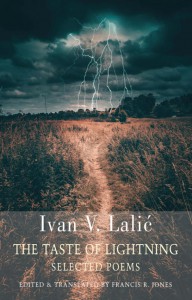
The Taste of Lightning: Selected Poems by Ivan V. Lalić, translated from the Serbian by Francis R. Jones, Bloodaxe Books, 2025
Review by Nichole Gleisner
Through chronologically ordered selections from the major works of Yugoslav poet Ivan V. Lalić, The Taste of Lightning has the aim of cementing its author as a vital post-WWII voice. The poems are thick with place, with memories often sketched in diffuse, fleeting detail rather than piercing vividity, exploring how place is akin to myth. Fictional landscapes appear with frequency (Byzantium, Atlantis), layered in between actual locales (“Aosta,” an Italian alpine valley; a “Tomb in Prague”; “Belgrade airport”; Venice); for Lalić, place—whether actual or storied—is experienced by the mind, for it is ultimately the passing of time that transfigures all our knowledge of the world. As he describes in “Eye-witness report”: “This rock is no rock, it’s a hill of memory / slowly shifting in its bed and starting / to fall apart, the shape of ash eroded by rains.”
In his introduction, translator Francis R. Jones shares that the words for “poem” and “song” are the same in Serbian: pesma. The translation then takes care to reproduce certain rhyme schemes and other formal elements of the more traditional verse that Lalić sometimes employs. In many instances, the melodies ring out—but at other moments, the reader may raise a brow at the contortions taken to achieve rhyme:
A merciless morning, rain blue-voiced and raw
At the window, experience shackling my movements. While
Each morning I am weaker, the gods just smile
What does resound throughout these poems is Lalić’s elucidation of memory’s transformations and disintegrations, a process toward place’s dissolution that is more acute when the presence of those we love throws its shadows. “Places we love exist only through us, . . . Places we love we can never leave . . . When you go, space closes over like water behind you.”

The Name on the Wall by Hervé Le Tellier, translated from the French by Adriana Hunter, Other Press, 2025
Review by Henry Gifford
The Name on the Wall is a historical detective story, a product and account of following clues and tracking down facts, one to the next. The first is the titular name on the wall, which Hervé Le Tellier finds etched into a home he buys in La Paillette, near Dieulefit, which had been a hub for the French resistance and a refuge for Jewish children and artists during the Second World War. That name then leads him to a young resistance fighter, Andre Chaix, and a notice of his death, “for France,” at the age of “twenty years, two months, and thirty days.” From here, Le Tellier investigates Chaix’s life, his family, and his service—but also the region, its history and economy, the others who lived there, and the reason he finds himself so drawn to this man, his life, and his death.
Chaix’s life, as far as Le Tellier uncovers, was no more interesting than that of any of his comrades, or really that of anyone living in a time and place as dramatic as Vichy France. He had parents, a brother, a fiancée named Simone—who receives the bulk of Le Tellier’s attention. He finds a box and an envelope of photographs with notes to Simone on the back, but not much can be gleaned from the contents, and whatever the author pursues is inevitably shaped by the knowledge of Chaix’s impending death. “I’ve reread what he wrote many times,” Le Tellier describes: “They’re such serious sentences for a teenager. Or perhaps it’s the other way around, perhaps they’re a teenager’s light-as-air words but they’ve been crystallized in tragedy for all time.” Chaix declares his enduring fidelity, and it has the tone of a great romance cut short. But many unfaithful or indifferent teenagers have insisted on their ardor; it’s just that most live long enough to prove otherwise.
What’s fascinating about The Name on the Wall is Le Tellier’s personal investment in Chaix’s—and Simone’s—story, not only because he’s forged a connection by an accident of location, but also because he’s been in Simone’s position. He too lost a lover at a young age, Piette, and “she too had just turned twenty.” Though this throughline disappears after about a third of the “novel,” and though he tries to deny its “tenuous” significance and even appears to resist its inclusion, the researcher cannot help but turn into the memoirist. Just as André’s death shades every detail of his life (as all young deaths do), to the point that even opening the box of photographs feels like “desecrating a tomb,” so does the suicide of Le Tellier’s girlfriend shade much of his novel. There’s a broader truth to be learned here, whether Le Tellier wants to teach it to us or not: There’s no such thing as impersonal writing, and no fiction that isn’t auto.
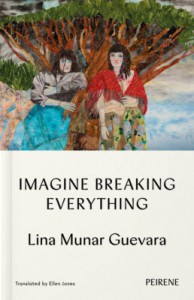
Imagine Breaking Everything by Lina Munar Guevara, translated from the Spanish by Ellen Jones, Peirene Press, 2025
Review by Liliana Torpey
In Lina Munar Guevara’s Imagine Breaking Everything, the teenage Melissa is full of rage—a rage that tends to strike out against anything and everything around it, leaving a path of wreckage trailing behind. At least, that’s what used to happen. Now, she lives with her Aunt Anahí (formerly known as Uncle Roberto) in a new neighborhood, and with the older woman’s encouragement and guidance, she has the opportunity to choose a different way. But can she?
Munar Guevara’s novel takes place in the tenuous stage between adolescence and adulthood, when one realizes the impossibility of outrunning both the consequences of actions and the pain that lies underneath. When Melissa—or “Meli”—spends a weekend in her old neighborhood with her mother, whom she hasn’t seen in seven months, she’s pulled apart by the gravity of the past and the potential of the future, and she doesn’t make it out without a couple bruises.
Told through a chummy teenaged inner voice, Imagine Breaking Everything is both readable and relatable. Meli’s voice is familiar, honest, and sincere, even in her many moments of sarcasm. It’s easy to sympathize with such conflicting feelings; she learns that being in pain can transform into causing pain, and she must choose whether or not to take responsibility. This popular thesis doesn’t stun or surprise, and what is posed as complex reads as rather straightforward—but the most interesting element of the book is Aunt Anahí, whose transition plays a large role in Melissa’s life as a model for honesty, integrity, and unconditional love. She is the family member that has put most on the line to be herself, and who can truly see the person that Melissa is. Their relationship and what it brings up—the desire to protect, avenge, to encourage pride—is what sets Imagine Breaking Everything from the familiar story of putting aside one’s most harmful instincts, of finally growing up.

Married Life by Sergio Pitol, translated from the Spanish by George Henson, Deep Vellum, 2025
Review by Nichole Gleisner
In Married Life, Sergio Pitol plunges the reader headlong into a nightmarish vision of conjugal life. It’s dizzying; it’s bewildering; it can be easily consumed in one sitting thanks to its frenetic pace, sleek novella profile, and fateful forward momentum. Somewhere along this immersion, the reader realizes that the plot turns over and over on the same idea: the protagonist, Jacqueline Cascorro, wishes to rid herself of her husband. Like a turntable needle stuck in a well-worn groove, she fixates on this desire despite the violent ways her plans fall apart, with each failure bringing crueler shades of suffering. Pitol aptly captures the cruel whiplash between self-determination and self-doubt as Jacqueline attempts to shake off the brutal twists of fate, even returning at times to loving her husband.
Married Life figures as the concluding text in Pitol’s “Carnival” trilogy, though it’s not necessary to have read the first two books (The Love Parade and Taming the Divine Heron) to appreciate this work on its own, with an element of the carnivalesque animating its spirit from start to finish. Pitol conjures the heady delirium of merry-making and masking while also ruminating, in a Bakhtinian way, on the topsy-turvy lies and dissimulations that people trapped in bad marriages must submit to in order for their relationships to endure, building a succession of nightmarish details that sinisterly echo throughout the text. Jacqueline obsesses over a key moment when “. . . she broke a crab leg with her hands and heard the popping of a champagne cork behind her, she allowed herself to be possessed by a wicked thought,” and Pitol masterfully channels these physical markers of memory as the crab leg and the champagne cork continue to surface along the novella as both emblem and harbinger.
Throughout, the best lines crackle with a jangly intensity: “On one occasion, shortly after her arrival in Cuernavaca, the cards told her that she’s already lived three different lives and that she’d have to live two more so that the pentagram of her existence would close in a natural way and the chords of all that she’d lived until then could merge into the melody that was destined for her astrally.” There’s much to return to and to gnaw on, both stylistically and metaphysically, in Married Life. Joining the six other titles that translator George Henson has brought into English, it is an enthralling addition to an already deep and varied collection.

My Excellency: Comedy in Three Acts by Luis Rechani Agrait, translated from the Spanish by William Carlos Williams, Swan Isle Press, 2025
Review by Henry Gifford
The first joke (after the title) of My Excellency comes in its list of characters: the first is “Tonia, a supporter of Buenaventura”; the next is “another supporter,” as is the third; the fourth is “an old friend”; and the next eight are more another-supporters. His Excellency Buenaventura Padilla is an old workers’ party leader on the brink of becoming president of the Chamber of Deputies—apparently the head of state—of an imaginary country—apparently an analogue of Rechani Agrait’s (and Williams’s mother’s) Puerto Rico. His heroic leadership has earned him his long list of supporters, as well as some powerful enemies, led by the capitalist Don Ramón Torres. Class conflict is embodied and personalized in these two figures, particularly in the police crackdown Torres ordered seventeen years ago, which killed Buenaventura’s wife and the mother of his daughter, Carmela. Her memory provides a gravity that holds the often ridiculous drama of My Excellency down.
The play is mostly a farce, but it’s also a tragedy. By the second act, Buenaventura has ascended to power. His sycophants (mostly foolish, a few noble) have government positions, and the police and newspapers are waiting on his command. But by the third (untranslated by Williams and included in this edition through a synopsis and the original Spanish), his government is collapsing under suspicions of corruption, orchestrated by Don Ramón. His men betray him, and his character, which at first seemed naïve, stupid, ambitious, and dangerous, reveals itself instead as pitiful, idealistic, hopeless, and admirable.
Most readers will be drawn to My Excellency by the translator’s name, and the poet does not disappoint. Williams spoke of translating into “American,” and with that in mind, produced the kind of domesticating translation no longer in fashion. The American reader will find the language for the most part familiar, from Carmela’s lovelorn reveries (“There was no misery, no riches . . . Because what difference did it make, one thing or another?”) to the policeman’s offer “to give a good clubbing to those you don’t like.” Most impressive, however, is his handling of Buenaventura himself, whose constant grandiose philosophizing is deflated in almost every sentence by malapropisms and mixed metaphors (or “semaphores,” as he would call them). Many translations of voices like this have an air of problem-solving to them, producing accurate but awkward and heavily footnoted phrases, but Williams’s prioritization here of a natural American English and genuinely funny lines is a good one: it makes for an enjoyable read, and a translation that seems to me truer to Rechani Agrait’s intentions and politics. Consider his stage direction at the start of the play: “The workers are encouraged to corrupt the language according to their own taste.”

Elegies of the Earth: Selected Poems by Ahmad Shamlou, translated from the Persian by Niloufar Talebi, World Poetry, 2025
Review by Sofija Popovska
In her introduction to Ahmad Shamlou’s Elegies of the Earth: Selected Poems, translator Niloufar Talebi describes the poet as “. . . a Hercules of sorts. Half-man, half-god. . . . The man created myths—of others and of himself.” Yet it is also worth noting that Talebi herself has accomplished a herculean task with her translation: a masterfully crafted, panoramic view of one of the most versatile voices in world literature. Enriched with paratexts offering invaluable knowledge about Shamlou’s life and cultural significance, as well as the inter- and intratextual allusions and overarching themes in his poetry, this collection serves as a perfect introduction for an anglophone reader who might feel intimidated to approach an oeuvre so complex and significant.
Talebi, who met Shamlou at one of her parents’ secret literary salons in Tehran, opens the text with a textured portrait of the poet. Shamlou was the “most erudite of cultural giants”; someone who had traveled “to every corner of Iran”; an intellectual bridging the gap between the West and the East while resisting western hegemony; a poet writing for and about the Iranian everyman yet defying “categorization within his own cultural tradition”; a husband who “penciled a love poem [for his wife] directly onto the white plaster of his bedroom wall”; a friend who first introduced Talebi to One Hundred Years of Solitude.
In Elegies of the Earth, Shamlou can be seen as a poet who closes the gap between word and life by addressing and awakening the reader’s humanity. Behind the lines “You amble along your peaceful road. Me, / I’ll walk danger’s path.” stands a poet who “staged a literary coup,” experienced imprisonment for his political views, and critiqued nationalist cultural tendencies, resulting in death threats and a ban on official gatherings at his gravesite. Despite its formal precision, these poems are anything but impersonal linguistic experiments; they constitute a tapestry woven from manifold elements of both Shamlou’s and other cultures, with a soulfulness that is universally understandable. “I am common pain—Cry me out” he writes. These poems work to answer this rallying announcement.
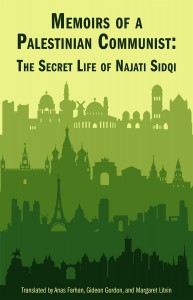
Memoirs of a Palestinian Communist: The Secret Life of Najati Sidqi by Najati Sidqi, translated from the Arabic by Margaret Litvin, Anas Farhan, and Gideon Gordon, University of Texas Press, 2025
Review by Nichole Gleisner
Reading the memoir of Palestinian writer, translator, and public intellectual Najati Sidqi (1905-1979) feels like an important discovery of an era. An intellectually curious, intrepid, and morally brave man, Sidqi was uniquely placed to witness history, and here, his ideas, facts, and findings are delivered in a wry, composed voice, free of ego. In the introduction, the translators take care to note Sidqi’s tendency toward discretion; the author elides personal details and emotions from his memoir in favor of a more impartial perspective.
The memoirs begin with Sidqi recounting the early years of the British Mandate in Israel and Palestine, which brought increasing numbers of Jewish settlers to the area; in fact, it was a small group of radical Ashkenazi Jews who first introduced the young Sidqi to communism. We then follow Sidqi to Moscow in the heyday of Stalin, beginning with the letter that the then-nineteen-year-old left for his father: “Don’t imagine that I’m going to the North Pole! I will be only a ten days’ journey from you!” There, Sidqi lives and attends classes at the Comintern’s Communist University of Toilers of the East, an experience vividly colored by his fellow communist students from all over the world—including the well-known Turkish poet Nazim Hikmet. Later, the young revolutionary goes to Spain during the Civil War to fight for the Republicans and is recruited to sway the Moroccan Arabs who had been coerced into Franco’s forces. After one speech to a group of soldiers, the Spanish fighter accompanying him asks: “What was that? Did you launch bombs from your mouth?”
To accompany this stretch of tumultuous history, Memoirs of a Palestinian Communist is rich with contextualization for the general reader in the form of multiple introductions, informative footnotes, photographs, a chronological timeline, and suggestions for further reading. One can easily follow Sidqi’s acts of resistance, from his incarceration in a British-Palestinian prison under trumped-up charges, to when he denounces Hitler and Stalin’s alliance, formalized in the 1939 Molotov-Ribbentrop Pact. In response, he goes so far as to write a book outlining how Nazism is incompatible with Arab thought, which resulted in his ostracization from the Communist Party and subsequent inability to find work.
Aside from Sidiq’s clarifying testimony, there is also much to admire in his lucid writing. In a description of snow, we catch the normally understated young Palestinian marveling: “One of the most wonderful sights in winter was seeing water particles in the atmosphere, in an extreme degree of frost, transformed into crystalline geometric models.”
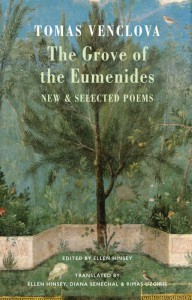
The Grove of the Eumenides: New & Selected Poems by Tomas Venclova, translated from the Lithuanian by Ellen Hinsey, Diana Senechal, and Rimas Uzgiris, Bloodaxe Books, 2025
Review by Jason Gordy Walker
Juggling roles as a founding member of the Lithuanian Helsinki Group, Soviet dissident, professor, historian, essayist, and distinguished poet, Tomas Venclova has produced a steady stream of highly intellectual and humane works since being welcomed into the US literary scene in the late 1970s by his friends Czeslaw Miłosz and Joseph Brodsky. Picking up where Venclova’s previous selected volume, The Junction, left off, the poems in The Grove of the Eumenides offer a strong sense of the poet’s late style: often rhyming, employing iambic or syllabic metrical patterns, and with many examining the themes of aging, memory, and cycles of history. The resulting collection is layered with myth, philosophy, and political wisdom, shimmering with rich context and thoughtful diction, and invokes a compassionate, democratic spirit that is as important now as it has always been.
In “Caligula at the Gates,” which concludes the second of the book’s four sections, Venclova pens a tragic stanza after describing a “short-lived” respite:
The room is besieged by clashing steel,
The heavens darken; the sea’s forces rage.
Blow out the candles and close the gates.
Beyond them—Caligula and the plague.
In this poem’s sixteen lines, Venclova utilizes an array of visual detail to remind us that resting never comes easy, and that historical moments truly do repeat themselves—albeit in different guises. Consistently, he points out the banality of power-hungry men and their murderous systems; after all, some tyrannical maniac, like Caligula, is always ready to kill, steal, and destroy. In “Dictator,” this is the pompous Nicolae Ceauşescu of Romania, who becomes nothing but a memory after his death—an awful one his country would rather forget: “and a schoolboy closes a book, barely a second look, / never memorising his name.” Then, in the setting of World War II, “The Process of Beatification” tells the story of a nun, Elizaveta Kuzmina-Karavaeva (or Mother Maria), who saves the life of a young female French resistance fighter by trading clothes with her to deceive the guards: “. . . The nun / knew only too well that God lay in / a bomb crater’s abyss; in a pit, / a bullet through the back of the skull, / rotting beneath the tundra’s lichen.” Poignant in its frank portrayal of solidarity against fascism, this poem simultaneously doubts and recognizes divine love. In telling the stories of real-life figures both heroic and villainous, Venclova’s language is smart and never pompous, calculated but not stilted, doing justice to bravery and condemning terror alike.
“The Way to Planty Park, Kraków,” a prose poem, stands out as the book’s tour de force. In thirteen short paragraphs, it explores the poet-speaker’s personal memories and ruminates on aging. The voice is melancholic but never overly so—a fine balance of gratitude and hope shining through a sage world-weariness/wariness, as exemplified in the poet’s quoting of Solon: “Call no man happy until he’s lived through all his appointed days.” The envelope technique is applied here to great effect, beginning with “The jasmine blooms between tramway stops.”—and ending with:
Everything gets bigger towards the end—distances, jasmine bouquets, and cobblestones. Only wonder has no dimensions, wonder that there is a world at all, and that it remains after you are gone.
Ellen Hinsey, Diana Senechal, and Rimas Uzgiris have provided a great service by presenting Venclova in their unified, expert translations. The diction feels natural, the lines hold weight, skillful allusions abound. The title poem references Sophocles’s Oedipus at Colonus: “Now meet your fate not in Athena’s place, / nor Thebes’, but in what is left of Colonus.” Elsewhere, “Cavalryman near Seinai” recounts the heroism of Nikolai Gumilev, Anna Akhmatova’s husband and a poet himself, who fought in World War I before his being executed by the Bolsheviks.
From Eastern Europe to Greece, Greenland to Hamden, Connecticut, Venclova takes the reader on a tour across the world and the historical events that have made it, in turns, so horrifying and so beautiful. Both Brodsky and Miłosz won Nobels, and after reading this exquisite collection, I’m left wondering: Where’s Venclova’s?
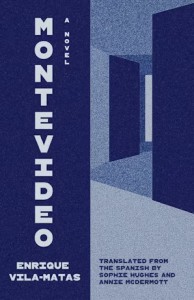
Montevideo by Enrique Vila-Matas, translated from the Spanish by Sophie Hughes and Annie McDermott, Yale University Press, 2025
Review by Jason Gordy Walker
Enrique Vila-Matas, famous for his erudite metafiction, has further solidified his giant status with Montevideo, his latest novel to be rendered into an exquisite Kafkaesque-Borgesian-Nabokovian-Cortázarian—or, let’s just say, bonafide Vila-Matasian English by Sophie Hughes and Annie McDermott. Like much of the Nobel contender’s work, Montevideo’s humor develops via first-person digressions that lead the reader through a labyrinth of allusions, referencing writers both real and imagined. In only the first several pages, there is a long litany of appearances: Lucy Sante, Emil Cioran, Ricardo Piglia, Herman Melville, Miklós Szentkuthy, Antonio Tabucchi, Roberto Bolaño, Laurence Sterne, and a certain Madeleine Moore. The list expands quickly, and some of the mentioned begin to establish themselves as not only the friends and heroes of the unnamed narrator, but part of the author himself. Per usual, Vila-Matas revels in blurring reality with fiction: “. . . any written version of a true story is always a kind of fiction—the moment the world is arranged into words, it is fundamentally altered.”
The narrator (possibly a stand-in for the “real” Vila-Matas) loves literature despite suffering a bad case of writer’s block—or rather “Rimbaud syndrome,” a condition examined in a previous novel by the narrator, Virtuosos of Suspense, that “. . . became a nightmare . . . buried under my skin like the apple Gregor Samsa’s father threw at him,” and which bears a striking resemblance to Vila-Matas’s own Bartleby & Co. It speaks to the author’s mastery, then, that these perception-games welcome the reader into the text’s meandering trails instead of alienating them, threading a thrill into the minimal yet potent plot and the offbeat characters.
Montevideo is divided into six distinct and cohesive sections, each named after places that the fictional author visits (in one way or another): Paris, Cascais, Montevideo, Reykjavík, Bogotá, and Paris again. The chuckles begin during the first section, in which a younger version of the narrator moves to the City of Light with hopes of writing something “lost-generation style,” but ultimately fails to do so and ends up dealing drugs, “. . . overcome, what’s more, by a sudden indifference to culture more generally; an indifference that cost me dearly in the long run and was even reflected in the oafish title I gave to my account of those turbulent times: A Garage of One’s Own.” He goes to “lousy parties, albeit with plenty of red wine,” and always leaves his acquaintances with a goodbye that only he finds funny: “Did you know I’ve stopped writing?” This eccentric, essayistic, wryly existential sense extends throughout the sections, but especially here, the anecdotes featuring his friends Tabucchi and Moore (an artist turned writer who seems to me completely fabricated), are as sharp as a quill.
The title section, my favorite and arguably the most entertaining, centers around the narrator’s casual interest in Julio Cortázar’s atmospheric short story “The Sealed Door”; as he admits, he is no Cortázar afficionado, but his curiosity grows into a “Cortazarian paranoia” after he visits the Cervantes Hotel in Montevideo, Uruguay. Surprised to learn that the hotel staff have no idea Cortázar had set his story in Room 205, with its mysterious door leading to another room where a baby’s strange crying persists throughout the night, Vila-Matas’s narrator enters the story within the story, and despite not setting out to write about his experience, he ends up writing about his experience of not writing about his experience.
Like Nabokov’s Pale Fire, Sterne’s Tristram Shandy, and the Icelandic sagas, Enrique Vila-Matas’s Montevideo defines literature as potentially infinite, even in its foolishness to be immortal, and that such an affinity for infinity can lead its followers always into another room, another book, another life, ad infinitum—that is, if it does not cast one into the abyss.
Henry Gifford is a freelance copy editor and translator.
Nichole Gleisner is a writer and translator and teaches in the French Department at Yale University.
Liliana Torpey is a writer and translator from Oakland, CA. Her work has appeared in The Rumpus, NACLA, and Euronews Culture. She is currently pursuing an MFA in Creative Writing at San Francisco State University.
Jason Gordy Walker is a poet, translator, and prose writer. His translations of poems from the Norwegian of Rune Christiansen are forthcoming at B O D Y (Czech Republic) and Cordite Poetry Review (Australia). Walker was the February 2025 Artist-in-Residence at Newnan ArtRez in Georgia, U.S.
*****
Read more on Asymptote blog:

